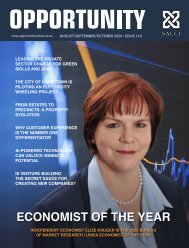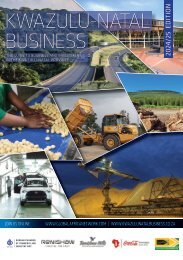Blue Chip Journal - June 2019 edition
You also want an ePaper? Increase the reach of your titles
YUMPU automatically turns print PDFs into web optimized ePapers that Google loves.
COVER PROFILE<br />
Why outcome-based investing<br />
is easier than you think<br />
How should investors process the<br />
emotions that they feel during<br />
increased market uncertainty?<br />
They need to understand how their<br />
investments behave and know what is<br />
likely to happen before it happens. Equity<br />
markets are volatile and will lose capital<br />
from time to time. We have to inform<br />
clients that this will happen, making<br />
sure they know they can afford to lose<br />
capital in the short term, reassuring them<br />
they have enough time for markets to<br />
recover, and enforcing the message that<br />
the points of greatest risk often coincide<br />
with the best opportunities. This will give<br />
clients the confidence to remain invested<br />
even when the unexpected happens.<br />
Try to understand what drives<br />
uncertainty in the markets, as it is often a<br />
short-term phenomenon. Do some of your<br />
own research by understanding that it is<br />
better to remain calm and invested during<br />
uncertain times, and don’t look at your<br />
investment values on a day-to-day basis.<br />
Research showing that investor returns<br />
are lower than investment returns has<br />
been done frequently. What is likely<br />
to trigger an improvement now?<br />
Greater levels of knowledge and<br />
professionalism in the financial adviser<br />
space, together with better tools should<br />
align expectations more realistically.<br />
Unfortunately, this is not a silver bullet,<br />
and there will be many instances of clients<br />
being disappointed. Ultimately, clients<br />
need to exercise their choices and should<br />
choose their financial advisers carefully.<br />
Switches and cash flows often affect<br />
investor returns. Keep switches to a<br />
minimum and only switch if absolutely<br />
necessary or if the investment strategy<br />
changes.<br />
Most people don’t know what they<br />
want to do next year. How should<br />
they go about understanding<br />
their life-long goals?<br />
I think this is as a result of just not spending<br />
the time and effort thinking about the<br />
future and constructing stories of where<br />
and what they want to be. This is an<br />
opportunity for financial advisers to start<br />
conversations with their clients where they<br />
look at their dreams, needs and fears, and<br />
then systematically make this practical and<br />
achievable.<br />
Often we don’t understand our lifelong<br />
goals. What we do know is we want<br />
to retire comfortably and perhaps have<br />
enough money to travel and leave a<br />
legacy. This should already be enough<br />
to start a conversation and change the<br />
mindset of the investor to a longerterm<br />
view as opposed to short-term<br />
focus on risk.<br />
We manage all funds with the outcome<br />
as the focus. It’s not just a single outcome<br />
of inflation plus 5%, for example. It’s also<br />
about the experience the client has over<br />
time. It’s a fantastic story to tell and a<br />
great “aha” moment when the client<br />
finally gets it and fully understands the<br />
"what" and the "how". Once we reach that<br />
point, it is difficult to lose clients, and the<br />
whole conversation and type of language<br />
we use changes when we give feedback.<br />
Suddenly, clients understand that we<br />
don’t focus on our competitors but on<br />
the outcome and the experience. How<br />
we perform relative to our competitors<br />
is now a consequence, not the focus. We<br />
stand for keeping clients invested, using<br />
diversification and, in that<br />
process, making the journey<br />
comfortable.<br />
How does outcomebased<br />
investing align<br />
with active or passive<br />
investment management?<br />
We don’t believe it is an “or”<br />
but rather an “and”. Active<br />
or passive investing are<br />
tools in a toolkit that can<br />
address different needs<br />
and, in some instances,<br />
complement each other. Our<br />
funds generally use a blend<br />
of these approaches where it<br />
makes sense: passive for cost<br />
control, risk management<br />
and to get direct exposure<br />
to market movements, whereas active<br />
management opens up alternative<br />
sources of return, the potential to add<br />
outperformance relative to a market<br />
benchmark.<br />
The decision between active or<br />
passive investing or a combination<br />
is always approached from what the<br />
solution is targeting as a whole. Cost<br />
control is a driving factor, but so is<br />
risk and reward. Active strategies are<br />
used only where there is a clear value<br />
to be added from an outperformance<br />
perspective over time after costs have<br />
been deducted. The combination of<br />
active, passive and alternative passive<br />
strategies, for example smart beta, helps<br />
create robust outcomes over time.<br />
How can you be sure that financial<br />
advisers not only understand their<br />
clients’ goals but also have the<br />
expertise to choose the appropriate<br />
solution that will maximise the<br />
probability of achieving these goals?<br />
We try to help financial advisers through<br />
education and tools, support and<br />
contact sessions, even by growing our<br />
own tied-adviser force. However, this is<br />
not a silver bullet and clients need to<br />
be selective about which company and<br />
financial adviser they choose to partner<br />
with.<br />
Suddenly, clients<br />
understand that<br />
we focus on the<br />
outcome and the<br />
experience – how<br />
we do relative to<br />
our competitors is<br />
now a consequence,<br />
not the focus<br />
16 www.bluechipjournal.co.za


















